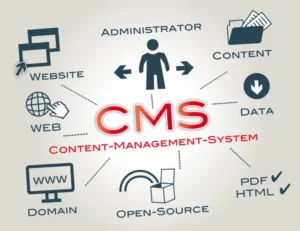Content management system is referred to as CMS. It provides the user with a GUI (Graphical User Interface) to operate the website and is the quickest tool for website development. Users don’t need to be familiar with databases or programming to create a website.
Small firms and corporations may manage content well with a CMS system. Many CMS systems include drag-and-drop page builders, which further simplifies life. A user now only requires a theme or UI design. Although CMS systems are the ideal choice for many organisations, not all businesses can use them.
The term “CMS” (Content Management System) will be defined in this essay, along with the benefits and drawbacks of using a CMS. Let’s get going.
Why CMSs are Important
There are numerous well-known CMS platforms, including, to name a few, WordPress, Joomla, Webflow, Drupal, and Magento. Most CMS platforms include themes by default. Additionally, there are numerous places where you may buy premium themes, such as Template Monster and Envato Market. The responsibility of website design is relieved by themes. Installing the e-commerce theme and beginning page editing are all that have to be done.
Productivity
By using a content management system (CMS), you may change, add, and remove pages from your website in approximately half the time and effort. A new site can be created and enhanced.
SEO

Rules that are crucial for SEO, such as updating the post often, title structure, visual appeal, and customer experience, are simple to change. As a result, you can raise your website’s position in search results.
User Experience
It retains certain actions, including memberships and search queries. Also, it assists the site operator by concurrently dynamically indexing published articles.
Mobile-friendly
With CMSs, there is no need to make additional modifications for mobile. The most sophisticated CMSs offer mobile optimization.
Common CMSs

WordPress
Matt Mullenweg founded WordPress in 2003. 90% of the websites now in use use it. With its improvements, it continuously meets modern needs.
Although it was initially utilised in the blog platform, it has now been integrated into a number of add-ons, improvements, and commercial websites.
WordPress makes it simple to build the website of your dreams with a range of themes and add-ons.
Benefits of Using WordPress
- As an open-source system, it can be upgraded.
- There are add-ons and themes related to your demands.
- There is a panel that is simple to grasp.
- Support VPN which has plenty of advantages for WordPress owners as VPN secure your website security. There are plenty of free VPN available in the market.
- Dynamic in its structure.
- Simple and quick to set up.
- User-friendly.
- Free VPS Hosting: WordPress also supports VPS (Virtual Private Server) hosting, which gives you more control over your website’s environment compared to shared hosting. Some hosting providers offer free VPS hosting services, which can be a cost-effective solution for small businesses or new website owners looking to minimize their initial costs while still enjoying the benefits of a more personalized and secure hosting environment.
- A range of add-ons from other parties
- Has many additional themes.
Disadvantage
- The inclusion of obscure or poorly sourced attachments may have security repercussions.
- For regular users and businesses, premium themes and add-ons can be pricey.
- The speed of the website could decrease as the number of add-ons and additional code grows.
Joomla
In 2003, Joomla was released by Mambo. You can use it to develop online applications and build websites. Its operating system is a little complicated. It has gained popularity as a CMS because of its expandability.
Benefits
- As an open source system, it can be upgraded.
- There are themes and add-ons based on your requirements.
- Free.
- Dynamic.
- Simple and quick to set up.
Disadvantage
- Have to know the code.
- The topic of plugins and themes is a little complex. Compatibility issues could arise.
- Hard to Use VPN
- The quantity of add-ons and additional added codes contributes to some speed issues.
- has a medium-difficulty panel.
- Security is lessened compared to other CMS. Threatened; open to danger.
- New users find SEO challenging.
Drupal
Since its release in 2001 by Dreis Buytaert, Drupal has been used by 1 million websites.
Benefits
- It’s a flexible system. Modules let you accomplish whatever task you desire.
- Many users and thousands of pages can be handled simultaneously.
- Provides free module support.
Disadvantage
- Needs technical know-how. This is why you must put in a lot of effort during setup.
- The quantity of add-ons and additional added codes contributes to some speed issues.
Pros of Using CMSs
Quick Development
The CMS is the fastest solution for creating web applications that are also mobile-friendly. We can increase the speed of website development by using CMS.
Less Coding in the Backend
A number of plugins are offered by content management systems for creating web applications. Therefore, that user doesn’t need to write any code.
Easy To Use Page Builder
Saving time is a primary objective of adopting CMS. The built-in visual page creator in CMS makes it easy to add, edit, or manage website content. The ability to construct reusable dynamic blocks and the ability to store the block-section and page layout as a template allow the user to manage the site’s content without the requirement for in-line modification.
Easy to Use
For the fundamental tasks, such as creating and publishing material and adding media, anyone can utilise a content management system.
Secure
To protect the website’s content and database from intruders, CMS has the finest security measures. With a permission-based system, the site’s author can restrict who can visit his website.
SEO Compliant
Because CMS websites make SEO much easier to deploy than HTML, they are SEO friendly. On the website, there are various plugins that directly support SEO.
Boost Customer Support
Improved client support is offered by CMS, including live chat and contact forms for any urgent questions and website-related problems.
Cons of Using CMSs
Dependency & Costly Plugins
Plug-ins and widgets have hidden costs
The price of several plugins and widgets can reach hundreds of dollars. Most of the functionalities that users can use must be provided by plugins and widgets.
Site loading time
A CMS-designed website’s page performance is noticeably poor when compared to many other custom development solutions.
Maintenance
System maintenance is required on a regular basis for CMS. Due to traffic and the site being a high-profile target, some of the websites need to be maintained on a weekly basis.
Conclusion
Now that you are aware of some of the benefits and drawbacks of a CMS system. So, the best option will rely on your company’s needs.

